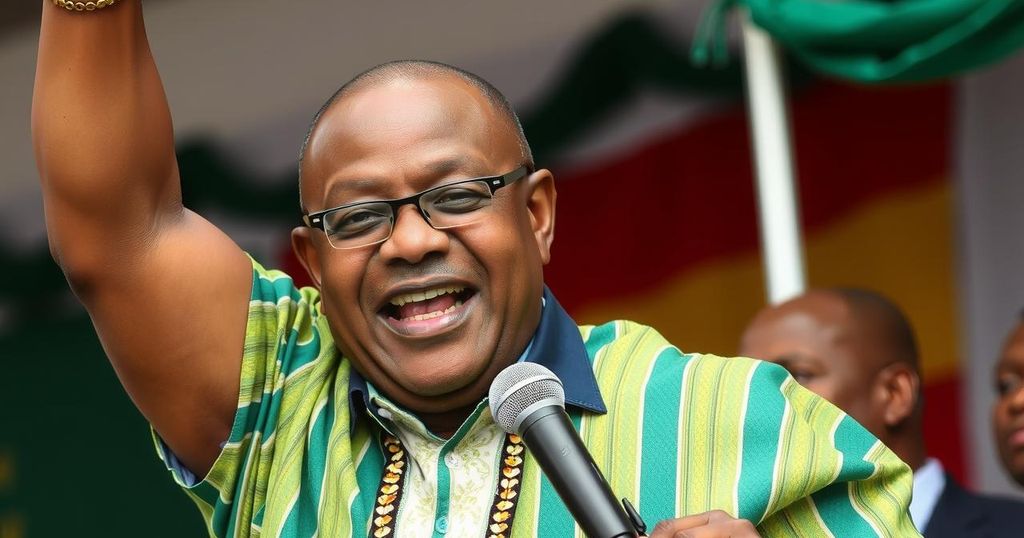John Dramani Mahama won the Ghana presidential election, defeating incumbent party candidate Mahamudu Bawumia amid widespread economic dissatisfaction. Bawumia conceded defeat immediately, acknowledging voter demand for change due to ongoing economic crises, including high inflation and currency issues. This election ends eight years of NPP rule and marks Mahama’s third attempt at the presidency after previous losses in 2016 and 2020.
Former President of Ghana, John Dramani Mahama, achieved a significant political triumph by winning the recent presidential election, a notable comeback after losing in both 2016 and 2020. His opponent, Mahamudu Bawumia, the ruling New Patriotic Party (NPP) candidate and current Vice President, conceded defeat shortly after the election, attributing the loss to dissatisfaction with the government’s handling of the economy. Voter sentiment was swayed largely by ongoing economic hardships, including soaring inflation and a currency crisis, which underscored the electorate’s desire for change.
In the wake of the election results, early estimates indicated that Mahama garnered approximately 56.3% of the votes, compared to Bawumia’s 41.3%. Bawumia, acknowledging the outcome, stated, “The people of Ghana have spoken, the people have voted for change at this time and we respect it with all humility,” as he expressed his congratulations to Mahama. Celebrations erupted among Mahama’s supporters soon after the election, a stark contrast to the sentiments felt by the ruling party amidst discontent over rising living costs.
This election marked the end of the NPP’s eight-year hold on power, characterized by a significant economic downturn, the highest inflation rates in years, and a failure to maintain fiscal stability. Despite the NPP’s attempts to stabilize the economy, including a $3 billion International Monetary Fund (IMF) bailout, the financial issues remained at the forefront of voters’ minds, signaling a shift in political allegiance.
History shows a repeated cycle of power shifts between Ghana’s two dominant parties, the NPP and Mahama’s National Democratic Congress (NDC), since the reinstatement of multiparty democracy in 1992. The NPP’s slogan, “Break the 8,” aimed at achieving an unprecedented third consecutive term, ultimately faltered amid negative perceptions of Akufo-Addo’s economic governance. Furthermore, Mahama’s return to the political arena raised some apprehensions, as his previous administration faced criticism for financial mismanagement and significant energy supply issues, commonly referred to as “dumsor.” Nevertheless, the current economic challenges provided Mahama with an opportunity to reclaim his position as the leader of Ghana and respond to the electorate’s demand for change.
The political climate in Ghana has been historically characterized by a stable democracy and an alternating leadership between the two principal political parties, the New Patriotic Party (NPP) and the National Democratic Congress (NDC). Following four terms with the NPP, the party’s grip on power has been tested by Ghana’s current economic struggles, including high inflation and substantial debt levels. These issues have inevitably shaped voter sentiment, prompting a demand for change, which Mahama capitalized upon in his bid to return to the presidency after two unsuccessful attempts in previous elections. Mahama’s victory signifies a pivotal shift in the country’s political landscape, as voters seek a response to the pressing economic dilemmas they face.
John Dramani Mahama’s significant electoral win marks a pivotal chapter in Ghanaian politics, particularly as it emerges from an era marked by significant economic challenges under the NPP administration. The swift concession from Mahamudu Bawumia and the expressed desire for change among voters reflect the electorate’s prioritization of economic management in decision-making. As Mahama prepares to assume office again, he will need to address the criticisms of his prior tenure while focusing on the urgent economic issues at hand to fulfill the promises made to the Ghanaian people during his campaign.
Original Source: www.theguardian.com






